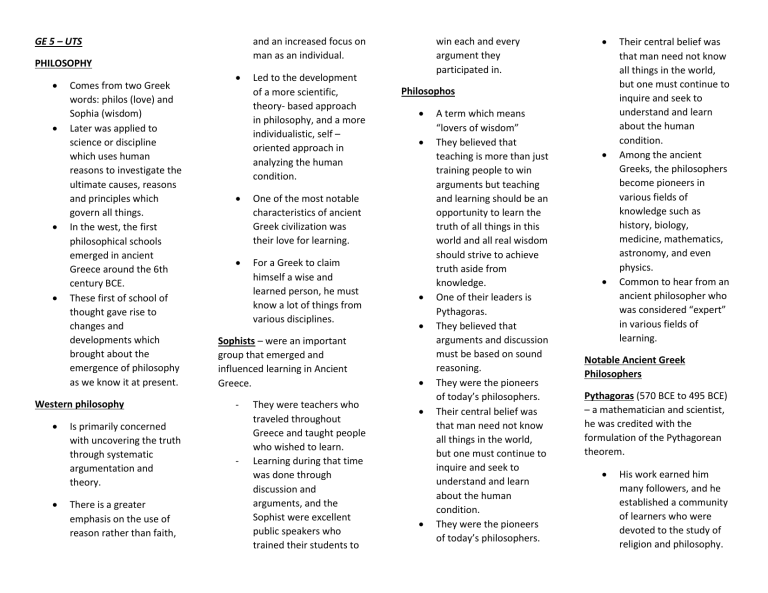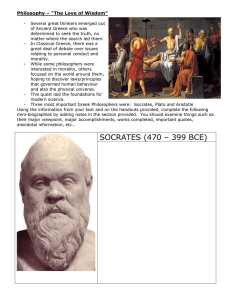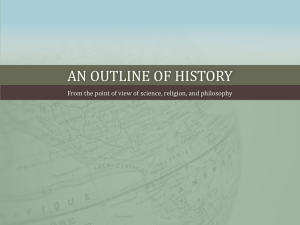
GE 5 – UTS and an increased focus on man as an individual. PHILOSOPHY Comes from two Greek words: philos (love) and Sophia (wisdom) Later was applied to science or discipline which uses human reasons to investigate the ultimate causes, reasons and principles which govern all things. In the west, the first philosophical schools emerged in ancient Greece around the 6th century BCE. These first of school of thought gave rise to changes and developments which brought about the emergence of philosophy as we know it at present. Western philosophy Is primarily concerned with uncovering the truth through systematic argumentation and theory. There is a greater emphasis on the use of reason rather than faith, Led to the development of a more scientific, theory- based approach in philosophy, and a more individualistic, self – oriented approach in analyzing the human condition. One of the most notable characteristics of ancient Greek civilization was their love for learning. For a Greek to claim himself a wise and learned person, he must know a lot of things from various disciplines. Sophists – were an important group that emerged and influenced learning in Ancient Greece. - - They were teachers who traveled throughout Greece and taught people who wished to learn. Learning during that time was done through discussion and arguments, and the Sophist were excellent public speakers who trained their students to win each and every argument they participated in. Philosophos A term which means “lovers of wisdom” They believed that teaching is more than just training people to win arguments but teaching and learning should be an opportunity to learn the truth of all things in this world and all real wisdom should strive to achieve truth aside from knowledge. One of their leaders is Pythagoras. They believed that arguments and discussion must be based on sound reasoning. They were the pioneers of today’s philosophers. Their central belief was that man need not know all things in the world, but one must continue to inquire and seek to understand and learn about the human condition. They were the pioneers of today’s philosophers. Their central belief was that man need not know all things in the world, but one must continue to inquire and seek to understand and learn about the human condition. Among the ancient Greeks, the philosophers become pioneers in various fields of knowledge such as history, biology, medicine, mathematics, astronomy, and even physics. Common to hear from an ancient philosopher who was considered “expert” in various fields of learning. Notable Ancient Greek Philosophers Pythagoras (570 BCE to 495 BCE) – a mathematician and scientist, he was credited with the formulation of the Pythagorean theorem. His work earned him many followers, and he established a community of learners who were devoted to the study of religion and philosophy. Heraclitus (535 BCE to 475 BCE) – he proposed that everything that exist is based on a higher order or plan which he called logos. For him, change is a permanent aspect of the human condition and he was credited with the saying, “No man ever steps on the same river twice.” schools of philosophy such as Cynicism and Stoicism. Epicurus (341BCE to 270 BCE) – He believed that philosophy could enable man to live a life of happiness. Democritus (460 BCE to 370 BCE) – He devoted himself to studying the causes of natural phenomena. He was among the first to propose that matter is composed of tiny particles called atoms. Diogenes of Sinope (412BCE to 323 BCE) - he was known advocate of a simple and virtuous life. For him, one should not only talk of virtue but should show it in words and actions. He emphasis on austerity and simplicity often went to extreme, and he was said to have lived like a beggar. His teachings and views were later developed by his followers and influenced the development of several His views gave rise to Epicureanism –a school of philosophy which believes that wisdom and simple living will result to a life free from fear and pain. Socrates (470 BCE to 399 BCE) Foremost philosopher of ancient times. Great contribution on the fields of ethics. He was known critics of intellectuals during his time. But he does not consider himself as “wise” and merely considering himself as “midwife” that help inquiring minds achieved wisdom. He also believes that philosophy allow a man to live a life of virtue. He formulated the Socrates Method – means examining a topic by devising a series of questions that let the learner examine and analyze his knowledge and views regarding the topic. discussed in an attempt to arrive at new knowledge. • PLATO (427 BCE to 347 BCE) • A student of Socrates, he wrote down his teacher’s writing. • His teachings ang writings were considered as the foundation of the Western Philosophy. • • • His most significant ideas included his Theory of Forms, which proposes that everything that exists is based on an idea or template that can only be perceived in the mind, these nonphysical ideas are eternal and unchanging. He also focused his studies on the ideal society and proposed an ideal model of government and society which is ruled by wisdom and reason. Plato is also known for his dialectic, a method of inquiry where two opposing ideas are His last contribution to learning was the founding of the Academy, an institution of higher learning which was the first of its kind in the West. ARISTOTLE ( 384 BCE to 322 BCE) • Was the prominent student of Plato. • However, disagreed with Plato’s theory of forms and took a different view in interpreting reality. • For him, all ideas and views are based on perception and our reality is based on what we can sense and perceive. • This view influenced the study of the physical sciences. • He was involved in a great variety of disciplines such as zoology, psychology, ethics, and politics. • He also proposed a system for the classification of plants and animals. • His studies in logic led to the formulation of a formal process of analyzing reasoning which gave rise to deductive reasoning – the process by which specific statements are analyzed to reach a conclusion or generalization. Archimedes (287 BCE to 212 BCE) • He was considered a leading scientist in ancient times • A mathematician, physicist, engineer, inventor and astronomer. • Archimedes inquiries into mathematics, gave rise to modern calculus. • He pioneered the use of mathematics to analyze natural phenomena. • He is credited for several inventions like, Archimedes screw, a device for raising water, and a method for determining volume using displacement. • The contribution of the ancient philosophers contributed greatly to the development and spread of philosophy in Greece and throughout Europe. • Many of their ideas survived through the centuries, and these formed the basis for the development of modern Western Philosophy.




